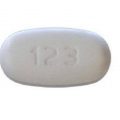The capsule-shaped white pill with imprint i7 has been identified as Ibuprofen 600 mg. It is supplied by Granules India Limited. Ibuprofen is one of the nonsteroidal anti-inflammatory drugs, used for treating pain, fever, and inflammation. Ibuprofen is primarily used to treat fever which includes post-immunization fever, i.e. fever in children after they get their vaccinations. It is also used to treat mild to moderate pains including post-surgery pain, menstrual cramps, osteoarthritis, dental pain, headaches, and pain from kidney stones.
Some inflammatory diseases such as juvenile idiopathic arthritis and rheumatoid arthritis can also be treated with ibuprofen. Ibuprofen 600 mg is not a controlled substance under the Controlled Substances Act (CSA).
How the i7 pill works
- i7 pill helps to relieve pain and inflammation by blocking the effects of cyclooxygenase (COX) enzymes. This prevents prostaglandin synthesis (prostaglandins elevate body temperature and make nerve endings more sensitive to pain transmission).
- Ibuprofen belongs to a group of medicines known as NSAIDs (nonsteroidal anti-inflammatory drugs).
Upsides of the i7 pill
- Effective for the relief of minor aches and pains due to arthritis, backache, the common cold, headache and migraine, menstruation, muscular aches, and toothache in adults.
- Relieves minor aches and pain in children aged 6 months or older.
- Temporarily relieves fever.
- Does not cause dependence and is readily available at a low cost.
- The incidence of stomach-related side effects is about half that seen with aspirin or indomethacin when ibuprofen is used at low dosages. However, this benefit is lost with higher dosages.
- Available as tablets, capsules, chewable tablets, suspension, and in an injectable form.
- Widely available over-the-counter.
- Generic ibuprofen is available.
Also See: 44334 White Pill
Downsides of i7 pill
If you are between the ages of 18 and 60, take no other medication, or have no other medical conditions, side effects you are more likely to experience include:
- Stomach-related side effects include indigestion, heartburn, and bleeding. People of older age, taking other medicines that affect the stomach, or who drink more than 3 glasses of alcohol per day may be more at risk. Ibuprofen has one of the lowest risks of stomach-related side effects compared with other NSAIDs.
- Most NSAIDs have been associated with an increased risk of stroke or heart attack. The risk may be higher in patients with pre-existing cardiovascular conditions and with dosages of ibuprofen greater than 1200mg per day.
- May require three to four times daily dosing because of a short duration of action.
- May not be suitable for some people including those with kidney disease, a history of stomach ulcers or other gastrointestinal disorders, pre-existing cardiovascular disease, or following coronary artery bypass graft surgery.
- May interact with some other medicines such as warfarin, SSRIs, ACE inhibitors, and diuretics.
Note: In general, seniors or children, people with certain medical conditions (such as liver or kidney problems, heart disease, diabetes, seizures), or people who take other medications are more at risk of developing a wider range of side effects.
Bottom Line
Ibuprofen is effective for the short-term relief of minor aches and pains. The risk of stomach-related side effects is about half that seen with aspirin although the risk increases with higher dosages and a longer duration of use.
Tips
- Take with food or milk if stomach disturbances (such as indigestion) occur with use. See a doctor if these persist.
- Always use the lowest effective dose for the shortest duration consistent with the condition being treated.
- If you are taking ibuprofen and find it is not working very well for you, you may like to try a different NSAID.
- Response to different NSAIDs can vary so switching types (for example, from ibuprofen to naproxen) may improve response.
- See a doctor immediately if you experience any difficulty with breathing, unexplained sickness or fatigue, loss of appetite, vision changes, fluid retention, or abnormal bleeding.
- NSAIDs should not be used in the last 3 months of pregnancy; ask your doctor before using any medication during pregnancy.
- Avoid ibuprofen if you have a history of asthma or hives due to aspirin use or other NSAIDs, like naproxen.
- Do not use this medicine if you have just had heart bypass surgery (also called coronary artery bypass graft, or CABG).
Response and Effectiveness
- Peak levels of the i7 pill (ibuprofen) are reached 1-2 hours after administration.
- Equally affects COX-1 and COX-2 enzymes.
Interactions
Medicines that interact with the i7 pill may either decrease its effect, affect how long it works, increase side effects, or have less of an effect when taken with ibuprofen. An interaction between two medications does not always mean that you must stop taking one of the medications; however, sometimes it does. Speak to your doctor about how drug interactions should be managed.
Common medications that may interact with the i7 pill include:
- ACE inhibitors or ARBs, such as captopril, enalapril, or losartan
- antibiotics, such as ciprofloxacin or vancomycin
- anticoagulants (blood thinners) such as apixaban, dabigatran, fondaparinux, heparin, or warfarin
- antidepressants, such as citalopram, escitalopram, fluoxetine, or paroxetine
- antifungals, such as voriconazole
- antiplatelets, such as clopidogrel or ticagrelor
- beta-blockers, such as acebutolol, atenolol, bisoprolol, or carvedilol
- bisphosphonates, such as alendronate
- corticosteroids, such as dexamethasone or prednisone
- digoxin
- diuretics (water pills), such as chlorthalidone, chlorothiazide, hydrochlorothiazide (HCTZ), or furosemide
- glucagon
- haloperidol
- HIV medications (eg, Stribild, tenofovir)
- metformin
- other nonsteroidal anti-inflammatories (NSAIDs), such as celecoxib, diclofenac, etodolac, ketorolac, meloxicam, nabumetone, or naproxen
- sulfonylureas (a type of diabetes medication), such as glimepiride, glyburide, or glipizide
- supplements, such as glucosamine, omega-3 fatty acids, vitamin E
- others, such as cyclosporine, lithium, methotrexate, pemetrexed, pirfenidone, or tacrolimus.
Drinking alcohol while taking the i7 pill may increase the risk of gastrointestinal-related side effects or kidney damage.
Note that this list is not all-inclusive and includes only common medications that may interact with ibuprofen. You should refer to the prescribing information for ibuprofen for a complete list of interactions. READ: 8 Facts About MIA 110 Pill You Should Know





